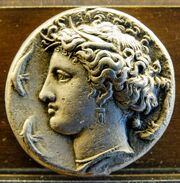(Adding categories) |
No edit summary Tag: sourceedit |
||
| Line 13: | Line 13: | ||
[[Category:Immortals]] |
[[Category:Immortals]] |
||
[[Category:Females]] |
[[Category:Females]] |
||
| − | [[Category:Deities]] |
||
| − | [[Category:Water Gods]] |
||
[[Category:Nature spirits]] |
[[Category:Nature spirits]] |
||
[[Category:Groups]] |
[[Category:Groups]] |
||
Revision as of 03:51, 19 June 2015

Arethusa (Ἀρέθουσα) means "the waterer". In Greek mythology, she was a nymph and daughter of Nereus (making her a Nereid), and later became a fountain on the island of Ortygia in Syracuse, Sicily.
An engraving by Bernard Picart depicting Alpheus in his attempt to capture Arethusa. The myth of her transformation begins when she came across a clear stream and began bathing, not knowing it was the river god Alpheus. He fell in love during their encounter, but she fled after discovering his presence and intentions, as she wished to remain a chaste attendant of Artemis. After a long chase, she prayed to her goddess to ask for protection. Artemis hid her in a cloud, but Alpheus was persistent. She began to perspire profusely from fear, and soon transformed into a stream. Artemis then broke the ground allowing Arethusa another attempt to flee. Her stream traveled under the earth to the island of Ortygia, but Alpheus flowed through the sea to reach her and mingle with her waters.
During Demeter's search for her daughter Persephone, Arethusa entreated Demeter to discontinue her punishment of Sicily for her daughter's disappearance. She told the goddess that while traveling in her stream below the earth, she saw her daughter looking sad as the queen of Hades.
Arethusa occasionally appeared on coins as a young girl with a net in her hair and dolphins around her head. These coins were common around Ortygia, the location in which she ends up after fleeing from Alpheus.
The Roman writer Ovid called Arethusa by the name "Alpheias", because her stream was believed to have a subterranean communication with the river Alpheius, in Peloponnesus.
